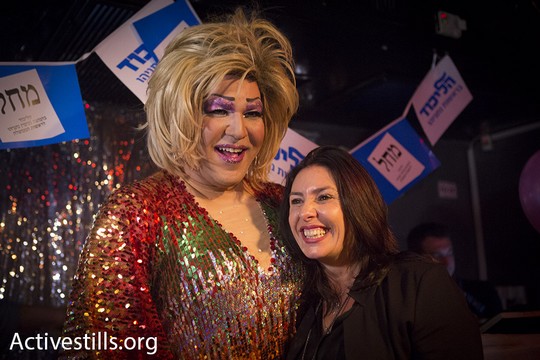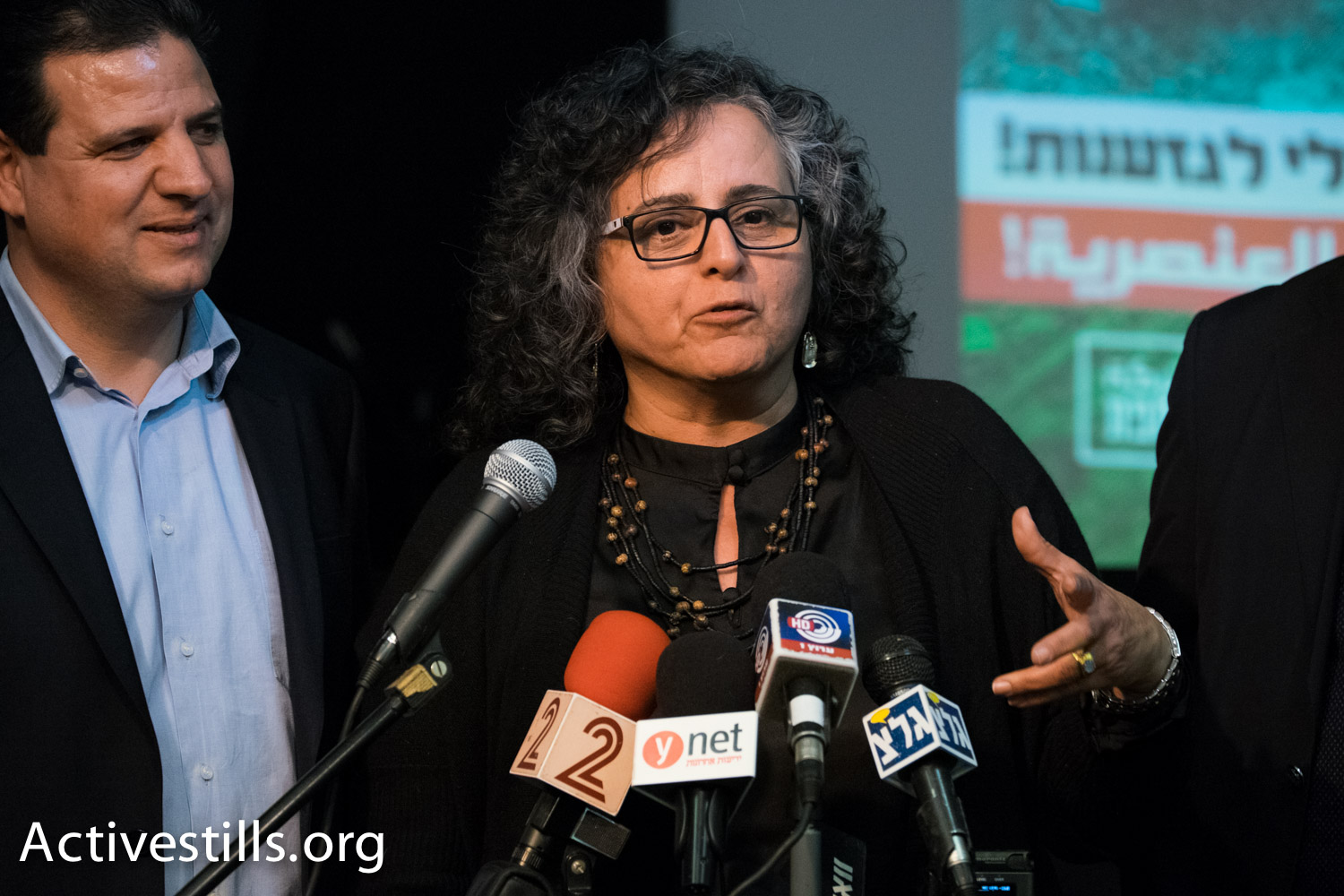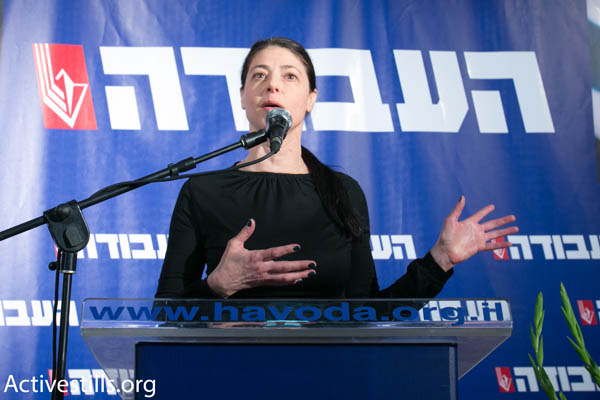The fact that the 20th Knesset will have a record number of female MKs does not mean they will necessarily advance women’s rights. Some of them, in fact, may end up doing just the opposite.
By Samah Salaime
Now that the winds have died down completely and I have finished writing all my commentary on the elections, I am returning to more familiar territory: feminism.
Many men wanted to see me return to this modest niche; you know, to deal with issues that are proper for a woman. “What do you care about politics?” my good friend asked me. “You are good when it comes to gender, women’s rights, domestic violence and the like. No one will oppose equality between men and women.” Once again we meet the Man-made separation wall, which makes a distinction between the feminine from the human, gender from politics, women and public life.
So for all those who were worried by the mess I made dealing with politics, and for the sake of maintaining good relations, I decided to return to my home base for a short while — to calibrate my feminist brain that has spiraled out of control. I decided to take a magnifying glass and look through the list of names of the newest Knesset members. Not in search of a social-economic agenda (are you kidding me?). Not from the perspective of “security” (have you ever heard an Arab woman speak about security in Israel?). MKs with a plan for peace?
And I won’t start joking about how Livni and Herzog tried to sell the idea of “re-igniting the peace process” — this is about as good as it gets right now, folks — and even on that front they failed. “Samah,” I said to myself, “Now you must focus on the mission of looking at the women of the 20th Knesset. Only women, please. Do not stray from the subject matter, not even for the sake of your precious Joint List.” And that’s exactly what I did.
‘I hear they’re intelligent’
Ladies and gentlemen, what can I say, I am in shock. The 20th Knesset registered but a slight increase in the number of women: 29 as opposed to the 27 women of the previous Knesset.
The ruling Likud party has three central women, of whom Miri Regev is the most prominent. For the sake of my own sanity, I will refrain from speaking at length about her. But to Regev’s credit, she went to war for the sake of one woman in these elections: Sara Netanyahu. Perhaps if she broadens the tent and copies her model of solidarity to all women in the country, there could be a chance for real change. Who knows.

In my eyes, Gila Gamliel is searching for a plan or issue to adopt and promote from inside the government. Perhaps the issue of gender will speak to her, and she will invest some more time in it during the following term. Tzipi Hotovely was involved in the crafting of several gender-related laws, such as the extension of maternity leave and a law that prevents photographing victims of sexual assault. But she has also voted in favor of many right-wing and problematic laws (if I must put it lightly) on the issue of the occupation and Palestinian rights.
As for the other three women — Anat Marco (a security expert who specializes in terrorism), Nava Boker (widow of one of the firemen who died fighting the fire on Mount Carmel in 2010) and Nurit Koren (social activist-lite and manager of the Likud branch in Lod) — I could not find a single piece of evidence that proves they are in the business of advancing the status of women in Israel. If they show even the slightest interest, I suggest pairing them up with a personal trainer to help them build up that feminist muscle.
Kulanu, Moshe Kahlon’s new party, which gambled on a “social-economic agenda,” brought four women into the Knesset. Like all members of “Kahlanu,” there is no doubt that they will mostly just thank their lucky stars for making it in. Aside from Rachel Azaria — the leader of a protest movement over the rising costs of child care — I could not find a single, impressive feminist achievement among any of them. However, I do feel that there is fertile ground for women with a social agenda to promote laws that benefit women. I simply worry that by the time they formulate a feminist political identity, we’ll find ourselves heading to another election.
Ayelet Shaked is the only woman in the Jewish Home party, while Yisrael Beiteinu has two women: Orly Levy-Abekasis and Sofa Landver. Like Shaked said about former soccer star Eli Ohana, who was given an automatic spot in the Jewish Home (before backing out due to backlash), “I was told they are intelligent.” I have no idea what the three are doing in these racist parties. What is certain is that they are not there for the sake of gender equality.
The next coalition will include two parties that are intentionally bereft of women, due to the fact that they are ultra-Orthodox. One of them is Mizrahi, the other Ashkenazi. But on the issue of women and equality, their opinions are identical and the issue is a non-starter.
Reaching an historical moment
With a coalition like this one, the situation of women will continue to be problematic. I wonder what the government will do regarding the last-minute decisions made before the previous Knesset adjourned and we headed into these pointless elections. For example, after a 15-year delay in comparison to the rest of the world, the previous government decided to establish a team that will formulate a governmental action plan to promote gender equality, based on the principles laid out in UN Security Council Resolution 1325.
In accordance with this decision, the team will try and identify how to integrate women from a range of social groups and identities into decision-making positions, integrate gender-based thinking into every decision-making process and protect women from all forms of violence. The decision has an eye toward a peaceful resolution to the Israeli-Palestinian conflict, and views these principles as ones that will guide society to a safer future. The decision also forces the integration of women in all levels of decision-making in the government.

I am sure that Aryeh Deri will pass any decision makes on to the women’s committee that advises his Shas party, if only for the sake of implementing Resolution 1325, and agree to the demand that all distribution of resources and legislation be done with a gender-based outlook, along with all the other revolutionary steps Israel is supposed to take in the spirit of the decision. In other words, it seems that the celebrations by women’s groups, who pushed the government to adopt the resolution, came too early (or were perhaps unnecessary). By the looks of the fourth Netanyahu government, the challenges aren’t going anywhere.
Twice as many Arab women
I only found women with a gender-based consciousness and a clear feminist agenda on the other side of the political map: three women in Meretz — Zehava Galon, Michal Rozin and Tamar Zandberg — were extremely active, and have an unmatched track record in terms of feminist, social activism. The same goes for Merav Michaeli and Stav Shaffir from the Zionist Camp, as well as Yesh Atid’s Aliza Lavi, who fought hard in the Knesset Committee on the Status of Women and Gender Equality.
By the way, the Arabs have the highest growth rate in terms of female representation in the Knesset (100 percent!): there was one term, and now there are two. I admit, I had a laugh writing this sentence. Haneen Zoabi will be joined by Aida Touma-Suleiman, one of the fiercest feminists I have had the pleasure of meeting.

But again, these women will all likely be in the opposition. I do not for a second belittle the work of the opposition outside the government. After all, it’s all the rage nowadays. But even Bennett and Liberman, after they wiped the saliva from their face during peace negotiations, declared that they will loyally serve the people from the rows of the opposition.
Therefore, beyond all the problems expected from the upcoming right-wing government — occupation, racism, incitement, violence, social gaps, poverty and flat-out economic failure — we can add the atrophying of the feminist muscle. How can I explain this phenomenon, this connection between the stagnant situation of women in politics and the stagnation (if not outright deterioration) of social, economic and political issues? It is actually very simple: wherever you find a feminist agenda, you will also find a social, democratic, human rights-based and “peace”-seeking outlook. Oh, sorry. I forgot we no longer say that word.
After all, what is the connection between a member of Knesset who organized the “Beast Parade” (to counter the Jerusalem Gay Pride Parade), and a female MK who is leading the struggle for the rights of women to live with whomever they want? How can one speak about chopping off the heads of political rivals with an ax, while at the same time discussing the murder of women at the hands of their husbands? Who can solve the issue of poverty while ignoring the fact that most of those below the poverty line are women? How will the Big Men of the Knesset solve the issue of public housing, when single mothers are the ones who make up the wait list for apartments? And how dare Netanyahu speak about existential security without understanding how a woman feels walking down an unlit street?
Social, economic and security issues have been solved by countries whose female participation in government hovers around 50 percent. And though it is freezing in those Scandinavian states, the discourse around integrating gender-based thinking in all aspects of life among both men and women (from a young age) is alive and kicking. It is part and parcel of their parliamentary work, among both female and male minister.
The answer? Shame those responsible
Women who want to advance gender equality in Israel can choose one of two paths: the first is simply to work with what we got in the elections, and learn how to promote the issue through the Knesset. This is a difficult and problematic mission, especially when considering those who will soon rule over our lives.
The second option is to start “Gender Watch” along with members of the opposition. This will allow us to monitor every expression, step, bill, budget proposal or decision that does not take gender into account, and start an intifada of shaming in the media against those responsible. You know, just like us women know how to do best. This too is no easy task, but we simply do not have a third option. Yalla, let’s get to work.
Samah Salaime is a social worker, a director of AWC (Arab Women in the Center) in Lod/Lyd and a graduate of the Mandel Leadership Institute in Jerusalem. This article was first published on +972′s Hebrew-language sister site, Local Call. Read it in Hebrew here.


